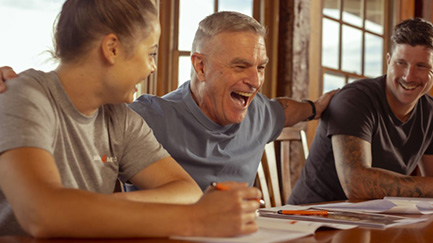Mates4Mates is delighted to share two reports on the social needs of Australian veterans’ families and Australian women veterans.
Social connection is a key priority for Mates4Mates in supporting veterans and their families transition from the Defence Force and recover from the impacts of service. To guide the development of our social connection stream of programs, we commissioned a Needs Assessment with a focus on social needs.
Written by consultant clinical psychologist, Dr Carolyn Deans, the ‘
Australian Veterans’ Families: Social Needs Assessment' and ‘
Australian Women Veterans: Social Needs Assessment’ reports provide an evidence-informed understanding of these client cohorts.
Veterans’ families’ social needs
For the report’s purposes, veterans’ families are considered the immediate parents, partners and children of veterans only. To gather the lived experience of the target population, 117 veterans’ families were directly surveyed on their needs, especially those in the peri-transition period.
Within the report, a number of sub-populations were identified within the ‘military family’ category who experience strong military related disruption, including families where the veteran has a physical or mental injury (or death) due to service.
Military-related stressors can also interact with non-military stressors including family conflict, rigid family role definition, family violence, childhood special needs, or parenting stress, and can contribute to poor outcomes.
Further challenges identified for veterans’ families included financial and housing changes on discharge from the military, childcare and support for children with needs, work-family conflict, and grief and bereavement.
Two broad categories of military-related stressors for families were identified within the report. Firstly, the impact that service life has on the whole family. This includes the disruption of postings and the demands of service on a member and how the family adjusts to that changing demand.
Women veterans’ social needs
Within the women veterans’ report, a variety of areas were examined including existing literature, the lived experiences of 227 women veterans, and the experiences of practitioners who work directly with women veterans.
This report outlines that women veterans cover the adult age span, with many of them between the ages of 40–70. Although most literature focuses on women as spouses and parents, women veterans are equally likely to be unpartnered or without children.
It was found that women veterans have varied lengths and experiences of service, which affect the rate at which military-related disruptions impact their wellbeing. Women veterans who have discharged from the military appear to maintain higher levels of physical health, housing stability, and occupational success in comparison to the general community.
Despite much focus on the mental health of veterans in Australia, the mental health of women veterans is reasonably on par with the general community. So too is their rate of exposure to sexual harassment, assault, and other forms of discrimination which are prevalent for women in Australia. Military service does, however, involve risk of early-life injury, illness or death.
Identifying needs within the Defence community
This project provides us with a unique understanding of the needs of Australian veterans’ families and women veterans in the social sphere.
While many government and non-government research programs review the psychological factors associated with entering life as a service spouse and the health of serving and ex-serving members’ immediate families, there was very little information showing the needs of veterans’ families in Australian society, that were not related to clinical or occupational needs.
Moving forward, these reports will now inform future Mates4Mates projects and work while also contributing to our strategic objective of ‘Service Excellence’ within our
‘Journey to 2030’ Strategic Plan.
A digital copy of the ‘
Australian Veterans’ Families: Social Needs Assessment' and ‘
Australian Women Veterans: Social Needs Assessment’ reports can be found on our website
here.


